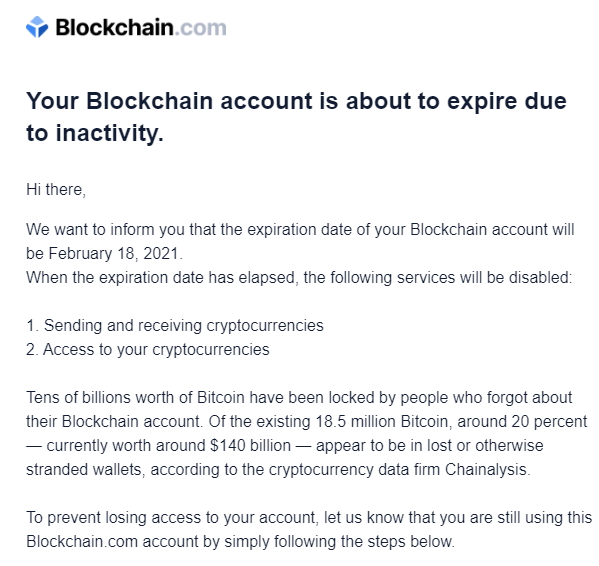Do you want to receive some free cryptos? Want to invest in high-yield opportunities? Are you worried about a security problem in your walletA crypto wallet is a user-friendly software or hardware used to manage private keys. There are software wallets for desktop... More? Did you fall in love on the Internet? Well, it’s totally possible for you to be robbed soon if you don’t pay enough attention. Sadly, this 2021 is also full of crypto-scams lurking from every online corner.
Sometimes, they might seem a bit obvious, but others are quite creative and insightful in their malicious attempts. That’s why, before putting at risk any of your funds, you’ll need some extra knowledge to make the best decision. Let’s check some popular crypto-scams online looking for more victims this year.
Fake Discord giveaways
According to the cybersecurity firm Kaspersky Lab, a group of scammers is surrounding the cryptocurrencyA digital currency running on a blockchain and built with cryptography. Contrary to central-bank issued currency, cryptocurrency issuance rules are... More servers on Discord, offering supposed crypto-giveaways via private messages. They pretend to be crypto-exchanges and use a lot of emojis and exclamations to announce the contacted person is the lucky winner of a huge crypto-giveaway. To claim their free money, this person only needs to register on the site and deposit some funds.

Of course, once that happens, you can say goodbye to your cryptos, because you’ll never see them again. Malicious domains hosting these fake exchanges are Bitcmoney, Itmaxbit, Crypto24cap, and Bit24cap; but they can be more. Be alert and don’t fall with these crypto-scams!
Expresscoinfx
According to themselves, “expresscoinfx.com is a Registered Investment platform for regular Investors. Our experienced team of dedicated developers, traders, and analysts who involved in crypto & Forex trading. You can make profit on a daily basis or after the end of investment period”. However, there’s no sign of such an official register nor the identities of the team behind.
What is clear, though, is there are no refunds and their contact email isn’t valid (probably their physical addressAn address is a blockchain equivalent to a bank account number in the traditional financial system, or an email address.... More in London either). Besides, you’ll need at least $500 in BTC to deposit, but you won’t be able to withdraw less than $1,500. In exchange, they promise earnings from 300% to 750%, based on non-specified activities and technologies.

Luckily, the website isn’t very popular, if we check on Alexa rankings. The problem is the victims are contacted and lured via social media, just like a man from New Zealand who unfortunately lost several thousand dollars to the scam. He stated that when he wanted to make a withdraw, they asked for more money instead. And he wasn’t able to recover his bitcoins.
BitcoinBitcoin is the first decentralized digital currency. It was created in 2009, by an anonymous founder or group of founders... More Up, Evolution, Billionaire, and so on
This fraudulent network change names and domains from time to time, but the style and modus operandi is always the same. The most probable way to know them is through a fake article about an interview with a famous person, who casually recommends these “investment platforms” as magical ways to make money. Something like this happened with the popular Irish broadcaster Pat Kenny, a few months ago.
“What’s made me successful is jumping into new opportunities quickly- without any hesitation. And right now, my number one money-maker is a new cryptocurrency auto-trading program called Bitcoin Billionaire. It’s the single biggest opportunity I’ve seen in my entire lifetime to build a small fortune fast. I urge everyone to check this out before the banks shut it down.”
Of course, the real Pat Kenny never said such a thing. Nor did the Singaporean tycoon Peter Lim, Jim Davidson (UK), James Corden (UK), Andrew Forrest (Australia), Prince Harry and Meghan Markle (UK), the presidents Martín Vizcarra (Peru) and Iván Duque (Colombia); or every single celebrity they impersonated. This year, they’re also recurring to sponsored press releases (and fraudulent paid reviews) in external media.

So, if a platform called Bitcoin Up, Bitcoin Billionaire, Bitcoin Evolution, or Bitcoin / Crypto “something” promises you high returns in exchange for a minimum of $250 by making automatic trading, run away as fast as you can. It’s nothing more than a crypto-scam.
Romance crypto-scams
Yes, romance, as to be in love. Like a British victim said: “I hadn’t even heard of the phrase ‘romance scam’. If I’d looked into it – I would have spotted the signs immediately”. The trick is as awful as it sounds. You can meet your future scammer in dating apps, where they’ll earn your trust, sympathy, and even love throughout even several months.
Then, one day, they’ll comment to you, as casual as possible, about how Bitcoin and/or cryptos are great investments, and they’ll invite you to put your funds in their platform (usually something about automatic trading). They promise huge returns, and since the victim sees them as a reliable and caring person, they might fall into the trap and send the money. They don’t give it back, and the crypto-scam is complete.

According to U.K. Action Fraud, around $93.8m were robbed like this in 2020. The police in Queensland (Australia) has warned the public about this, as well as the Financial and Consumer Services Commission (Canada), the U.S. Federal Bureau of Investigation (FBI), and, of course, the Action Fraud Police in the United Kingdom. Don’t be the next heart-broken victim.
Fake emails
This is some of a classic, in which the scammers aren’t keen to give up. It’s officially called “Phishing”: a fake version of something (website, app, software, message, call…), specially designed to deceive people and get from them valuable information, like bank or cryptocurrency credentials.
In this case, we’re talking about fake emails with official logos from real companies, making you know that your account/wallet is in danger or something like that. It’s quite common to receive emails “warning” you about suspensions due to inactivity or security issues in your account.

To fix the supposed problem, they send you a link where you can share conveniently your credentials on a website that looks exactly like the original if you don’t pay enough attention to the URL. Once with your credentials at hand, they proceed to go to the real webpage and drain your wallet.
Something like this has happened to the customers of the Ledger hardware wallet, because of a data breach. However, hot wallets like BlockchainBlockchain is a type of database storing an immutable set of data, verifiable to anyone with access to it —through....com and MyEthereumWallet (MEW) are constant targets for these attacks.
Don’t fall for crypto-scams
There is probably an extra ton of crypto-scams surrounding the Internet, so, it’s worth being careful. We can give you some recommendations to keep your cryptos safe:
- Don’t share too much information about your crypto-finances on public sites (like social media).
- If someone is offering you unbelievable amounts of money (as a giveaway or as an investment), don’t believe them so quickly. Take your time to make detailed research.
- About that research: never check only one review/source. Ask questions, and consult pages like ScamAdviser to measure the risk.
- The scammers can show up everywhere (including dating apps). That’s why you should never trust unknown people online, let alone if they ask you for money.
- Trade responsibly and don’t let greed guide you!
Wanna trade BTCAn abbreviation for Bitcoin., ETH, and other tokens? You can do it safely on Alfacash! And not forget we’re talking about this and a lot of other things on our social media.
Twitter * Telegram * Facebook * Instagram * Youtube * Vkontakte








